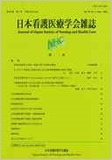Japanese
English
- 有料閲覧
- Abstract 文献概要
- 参考文献 Reference
要旨
本研究の目的は、2型糖尿病患者の食事の自己管理行動と、HbA1c値、自己効力感、ソーシャルサポート、負担感との関連を明らかにすることである。2型糖尿病と診断された入院・外来患者111名を対象とし、質問紙と診療記録より調査した。
その結果、血糖コントロール良好群は不良群と比べて、「摂取量を決めて食べる工夫」、「他の価値観を優先して食べることはない」、「無意識に食べてしまうことはない」、「過食を重ねない」の食事の自己管理行動得点が有意に高かった。また、自己効力感とソーシャルサポートの行動サポートの高値群は、低値群と比較して、食事の自己管理行動得点が有意に高かった。負担感の低値群より高値群の方が、「無意識に食べてしまうことはない」の食事の自己管理行動得点が有意に低かった。食事の自己管理行動を継続するには、自己効力感を高める関わりと行動サポートが得られるような環境を整え負担感を軽減する必要がある。
The aim of this study is to clarify the relationships of dietary self-management behavior with hemoglobin A1c levels, self-efficacy, social support and feelings of burden in patients with type 2 diabetes. One hundred and eleven inpatients and outpatients diagnosed with type 2 diabetes were examined based on data in their medical records and a questionnaire survey.
The results showed that patients with well-controlled blood glucose levels scored significantly higher than those with not well-controlled blood glucose levels in the following questionnaire items on dietary self-management behavior: “I am making efforts to eat according to the calorie intake that I decided,” “I am prioritizing eating healthy over other concepts of value,” “I do not have unconscious eating habits,” and “I tend not to overeat.” Scores for dietary self-management behavior in the high-value group of behavioral supports for self-efficacy and social support were significantly higher than those in the low-value group, but in the item, “I do not have unconscious eating habits,” the high-value group of feelings of burden scored significantly lower than the low-value group. In order to sustain dietary self-management behavior in patients with type 2 diabetes, it is necessary not only to create an enabling environment for relationship and behavioral support to increase their self-efficacy, but also to reduce their feelings of burden.
Copyright © 2018, Japan Society of Nursing and Health Care All rights reserved.


